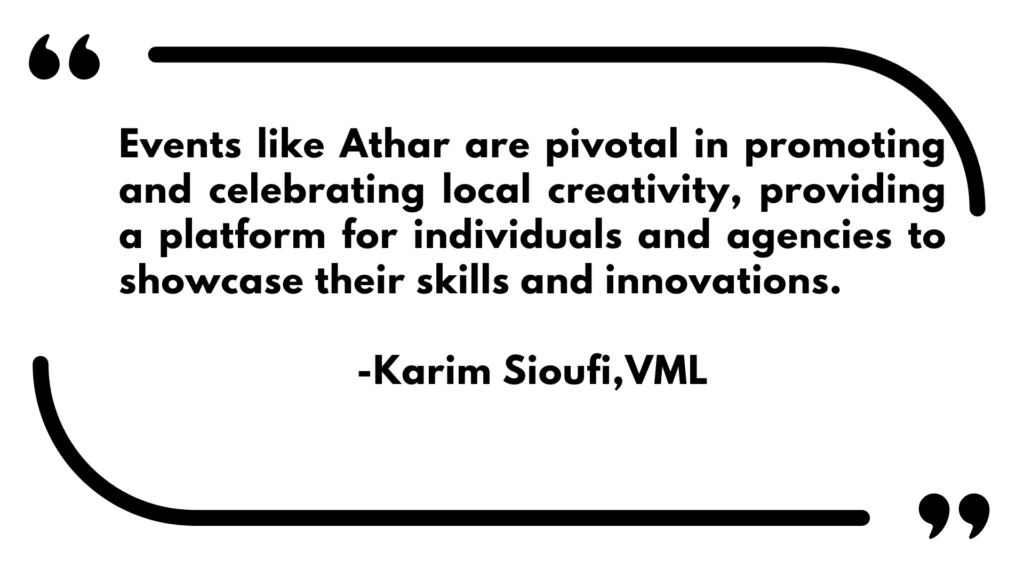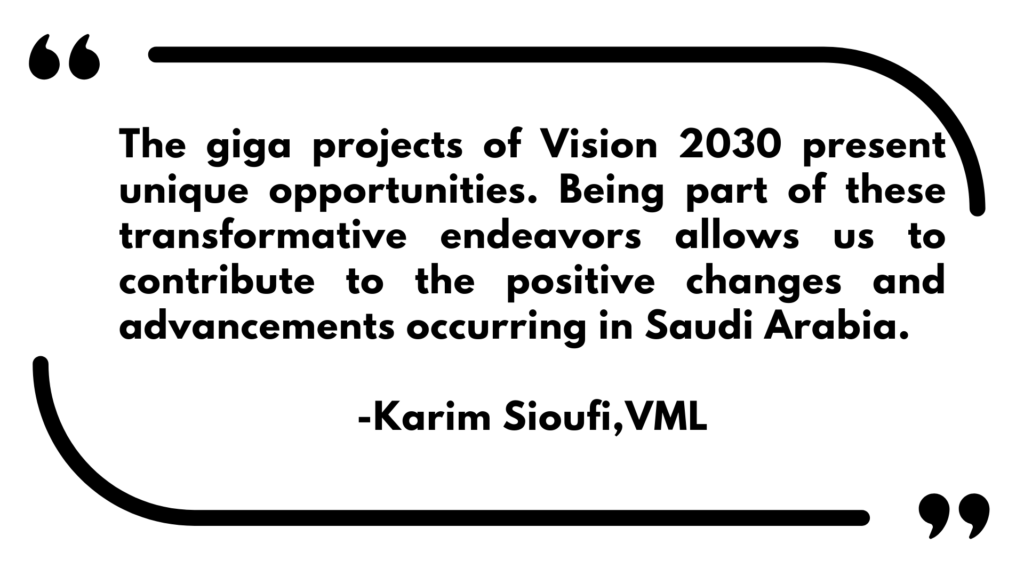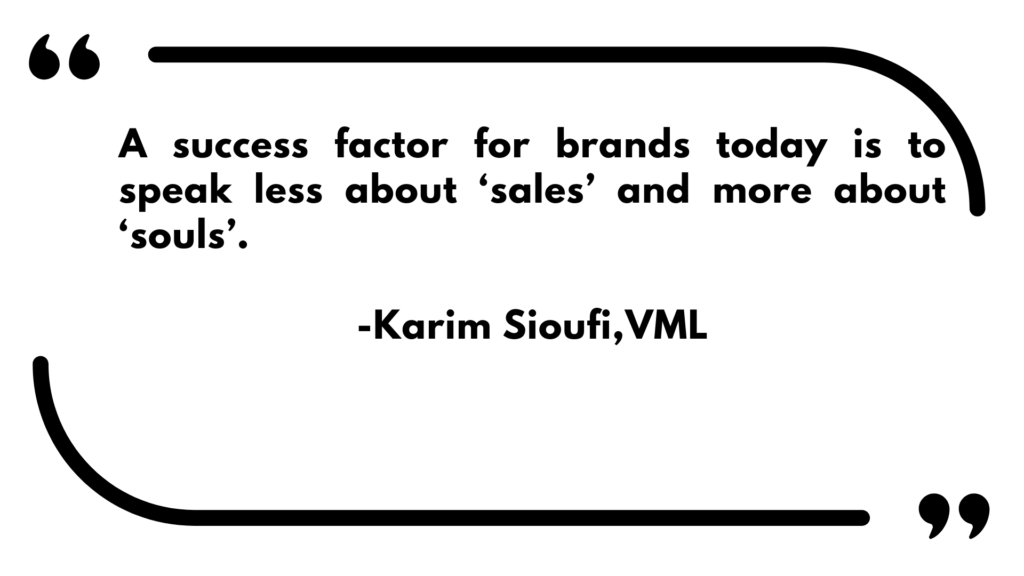VML’s Karim Sioufi: Transformative Insights in Marketing Excellence
Karim Sioufi, a seasoned Business Director at VML, brings a wealth of expertise garnered over an illustrious 15-year career across the global advertising and marketing landscape. He navigates seamlessly through diverse cultural terrains, establishing effective communication with stakeholders. His passion for collaboration, creativity, and excellence is the driving force behind innovative solutions tailored for clients in government, healthcare, FMCG, real estate, and entertainment. His remarkable journey, marked by the successful management of award-winning projects and the groundbreaking “The Subconscious Order” campaign for HungerStation, attests to his strategic acumen and unwavering commitment to authentic communication.
This exclusive interview unfolds as a captivating exploration of his extensive experience, offering profound insights into the ever-evolving landscape of advertising and marketing.
How did your journey in the advertising and marketing industry lead you to become the Business Director at VML (formerly Wunderman Thompson)?
My journey commenced in Paris before I ventured into the regional scene and transitioned to the agency side. This shift injected a fresh energy and dynamic into my career. The agency environment, with its emphasis on creativity, diverse projects, and a fast-paced atmosphere, kept me consistently engaged, motivated, and yes, a bit tired too.
Seven years ago, my strategic decision to join VML (formerly Wunderman Thompson) was a pivotal move aligned with my career goals and aspirations. Opting to work with one of the best players in Riyadh and globally, I knew I was becoming part of a team committed to making a significant impact and fostering innovation.
The diversity of experiences gained from working across various markets has added valuable perspective to my role. Adapting to different environments and markets has equipped me with a versatile skill set, expanding my portfolio, and nurturing a spirit of teamwork.
Big Congratulations. With the agency securing numerous awards across various platforms, the recent accolades of ‘Agency of the Decade’ and ‘Network of the Decade’ at the Athar Festival stand out as a significant accomplishment. Could you shed light on the key factors that played a role in this success, and how does it showcase the dedication and contributions of your team?
We were keen to participate in the inaugural edition of Athar. Actively contributing to three talks, we showcased our expertise and played a role in the exchange of ideas within the creative community. Our involvement in the festival not only underscores our commitment to the creative industry but also contributes to the growth and recognition of the creative Saudi community at large.
Winning both Agency and Network of the Decade was truly amazing! It stands as a remarkable testament to the collaborative spirit and dedication of our team. Achieving success at Athar is indeed a significant milestone, crowning years of hard work, creativity, and the combined efforts of both local and international talents.
We hope this success serves as a catalyst for even more opportunities and collaborations in the future. May our team continue to thrive in the dynamic and vibrant creative landscape.

The Subconscious Order for HungerStation, winning Saudi’s first-ever Grand Prix at Cannes Lions in June 2023, is a remarkable achievement. Can you share insights into the creative process behind this amazing campaign and how it aligns with VML’s (formerly Wunderman Thompson) commitment to innovation?
We began by searching for an insight or a human problem that we could address—a meaningful solution to an existing issue. This led us to the widespread problem of choice overload in online food delivery, something we all face daily.
Delving deeper, we discovered that, on average, people spend about 132 hours a year perusing mind-numbing menus online before deciding what to eat, often resulting in the wrong choice. Further research led us to a study by Dr. Bruce Lipton, revealing that the conscious mind can only process 40 bits of information per second, while the subconscious mind processes information at a rate up to 500,000 times faster. This discovery sparked the idea of helping people better connect with their subconscious mind to find the answers they seek, leading to the launch of “The Subconscious Order”: the very first food delivery placed by your subconscious mind. We collaborated with our tech team at VML (formerly Wunderman Thompson) Seattle and embarked on a journey to find the best and most effective approach to bring this idea to life. We were delighted with a statement made by Nancy Crimi-Lamanna, the Creative Commerce Jury President at Cannes Lions, regarding the project:
“In today’s world, brands have to apply meaningful value in order for people to offer use of their facial data, and ‘Subconscious Order’ did this beautifully. It’s a wonderful example of AI being applied to commerce and is a bold, brave way to change the user experience: turning transactional experiences into emotional ones.”
Personalization has become a key focus in advertising. How do you utilize AI to tailor campaigns to individual consumer preferences, and what challenges and opportunities does this level of personalization present?
Indeed, the potential of customizing customer needs with AI is immense, though the implementation is still evolving. As we increasingly gather and assess vast amounts of data, the objective is to refine and tailor offerings more precisely. While ideas are being presented, the challenge lies in technical execution and navigating customer concerns, especially those related to privacy breaches.
A noteworthy example of a safe and innovative use of AI for customized needs is the “subconscious order.” In this context, the concept involves leveraging AI to understand and anticipate customer preferences at a subconscious level. Through analyzing various data points and behavioral patterns, AI can discern individual tastes and preferences, allowing for a personalized and tailored experience.
However, customer resistance to sharing information remains a hurdle. The fear of manipulation or misuse of personal data is a legitimate concern. Striking the right balance between utilizing AI for customization and ensuring customer trust is crucial. Transparency in how data is collected, processed, and utilized, along with robust privacy measures, is key to overcoming this resistance.
As technology continues to advance, there is an ongoing responsibility to address these concerns, ensuring that AI-driven customization is not only effective but also respectful of individual privacy and autonomy.
The date of 2030 coincides with a key milestone in Vision 2030. How does this impact the agency’s strategies in promoting and capitalizing on the success of the Riyadh Expo 2023?
It’s truly remarkable to witness the evolution and progress that Saudi Arabia, particularly Riyadh, has undergone on the world stage. The hosting of Expo 2030 stands as a testament to visionary efforts and a commitment to showcasing the best the country has to offer. Our agency’s early involvement, focusing on campaigns related to art, culture, entertainment, and tourism, has played a crucial role in setting the stage for this momentous event. Notably, the Saudi National Day campaign, “We Dream and Achieve,” perfectly encapsulates the spirit of Saudi Arabia’s journey toward Vision 2030 goals. This ethos is not just reflected in words but in tangible projects and initiatives in which we actively participate.
The giga projects of Vision 2030 present unique opportunities. Being part of these transformative endeavors allows us to contribute to the positive changes and advancements occurring in Saudi Arabia. The readiness to welcome the world is not only an opportunity for the country but also for our agency to connect, collaborate, and engage in international cooperation.
As VML (formerly Wunderman Thompson) continues to play a pivotal role in these endeavors, it contributes not only to the success of Expo 2030 but also to the broader narrative of Saudi Arabia’s transformative journey on the world stage.

Given your proficiency in branding, how do you balance maintaining a brand’s core identity with adapting to evolving market trends and consumer preferences?
A brand is not a static entity; it thrives within a dynamic environment shaped by ever-changing factors like consumer behavior, market trends, cultural shifts, and technological advancements to name a few Authentic communication forms the bedrock of a brand’s connection with its audience. When a brand stays true to its essence, it establishes genuine connections, fostering trust—a vital foundation for enduring relationships. It’s a straightforward equation: consumers are naturally drawn to brands that mirror their values, making authentic communication paramount.
Successful brands exhibit adaptability and responsiveness to evolving needs, positioning themselves for continued success. Being agile without compromising core values enables brands to remain relevant and resonate with shifting consumer preferences. However, alongside adaptability, maintaining consistency in identity and messaging is equally crucial. This consistency cultivates a robust brand image and recognition. Striking the delicate balance between adaptation and consistency is an art mastered by successful brands.
In essence, a brand attuned to its environment, attentive to consumer needs, and committed to authentic communication is well-equipped to navigate the dynamic market landscape. By doing so, it not only adapts to current needs but also possesses the potential to shape and influence the evolving landscape for the better.
Can you share an example of a project where your skills in marketing, creative strategy, communication, and branding all came together to deliver exceptional results?
I take immense pride in showcasing a pivotal accomplishment in my career—the oversight of communications during the visit of the President of the United States to Riyadh. This momentous event unfolded within the context of a global summit, where I played an integral part of a small committee comprising five individuals. Together, we successfully managed the coordination and alignment of over 8 companies, each specializing in diverse fields such as PR, Creative, Digital, Media, and Production. Remarkably, this substantial task was accomplished just ten days prior to the President’s visit.
The magnitude of this project, combined with the diversity of expertise involved, presented a unique set of challenges that demanded strategic thinking and effective communication. The successful execution of such a multifaceted endeavour not only enhanced the reputation of our team but also left an indelible mark on my professional journey.
Spearheading a project of this scale, with international significance, has proven to be transformative for me. It has provided invaluable insights into my capabilities and potential that I might not have fully realized before.
The lessons I learned and the skills I developed are undoubtedly valuable assets that continue to positively influence and shape my career. I am grateful for the opportunity to have played a key role in such a significant project.

If there were an alternate reality where campaigns are immersive experiences, how would you design one to not just engage but transport the audience into a new dimension?
In essence, the evolving landscape of communication is about fostering a symbiotic relationship—one that goes beyond the transactional exchange of goods or services. Brands that recognize and embrace this paradigm shift are not just providers but compassionate companions, actively participating in and contributing to the consumer’s pursuit of self-expression, fulfillment, and well-being.
The rise of individualism in consumption reflects a desire for autonomy and a rejection of mass trends. Brands that understand and respect this inclination are better positioned to build lasting relationships with their audience. The shift towards collaboration and inclusivity in communication reinforces the idea that brands and consumers are partners in a shared journey.
A success factor for brands today is to speak less about ‘sales’ and more about ‘souls’. My recommendation for effective immersive experiences today would be centered around concepts related to customers’ mental health and simply the right to exist with all their differences.
By prioritizing genuine connection, shared values, and understanding, brands can transcend the transactional nature of their interactions with consumers and become integral companions in their personal journeys.


